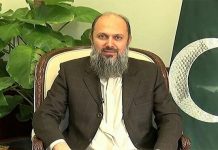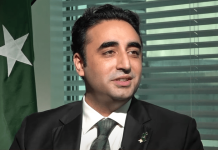—– Emphasizes that interim set-up has no ‘soft corner’ for PML-N
Staff Report
ISLAMABAD: Caretaker Prime Minister Anwaarul Haq Kakar on Thursday dismissed the impression that the decision of Pakistan Muslim League-Nawaz (PML-N) supremo Nawaz Sharif to return to Pakistan was part of any deal with the interim government.
The statement came as PML-N was gearing up to welcome their supreme leader on October 21 after a four-year exile in London.
Several streets in cities across Pakistan’s most populous Punjab province have been plastered with Nawaz’s life-sized posters, while rallies are already being organised to announce his much-awaited return.
PML-N plans to gather a crowd of 1 million people at the historic Iqbal Park in Lahore, the power base of the ex-premier’s party, on Oct. 21. The PML-N, facing growing public anger over its poor handling of the economy during a 16-month tenure with a coalition government that ended in August, is hoping that Nawaz can take the helm again in the run-up to the general elections slated for the last week of January.
“The caretaker government has ‘no soft corner’ for PML-N or any other political party…How can a caretaker government strike such a deal?” he said in an interview with a private digital media platform.
The prime minister was responding to a question related to the PML-N chief’s homecoming, who flew from London to Saudi Arabia yesterday.
Kakar pointed out that Nawaz left the country as per the court decision “under the nose of Imran Khan’s government, and not the caretaker setup”. However, he said that if the PML-N chief returns and takes part in politics, he will have to face some legal obstacles.
“The answers to these legal questions lie in legal remedies,” he said. Kakar said that any leader be it Imran Khan, Asif Ali Zardari, Nawaz Sharif, or anyone else would have to seek their legal remedy as per their case scenario.
He said that Pakistan was facing the formation of “regimental camps” and the country had been turned into a fighting ground for political positions.
He rejected the notion that the caretaker setup could be likened to that of 90s ‘Kakar formula’, where both then-prime minister Nawaz Sharif and president Ghulam Ishaq Khan were forced to quit on the direction of then-army chief General Waheed Kakar to make way for fresh elections.
“This comparison is apples and oranges. It is out of context because in our case, the stint of the normal parliament led to its retirement and we are part of the constitutional continuation where leaders of the house and the opposition agreed upon my name,” he said.
There has been no interference from any institution in our case, he claimed.
On general elections, he said that necessary security and administrative arrangements were in place, adding that the caretaker government, in collaboration with the Election Commission of Pakistan, was in the process of finalisation of the required measures.
On the expulsion of Afghan refugees, the prime minister reiterated that action was being taken only against unregistered foreign nationals and over one million illegal aliens.
The government’s objective, he said, was to regulate the movement of unregistered foreign nationals through proper process.
‘Situation between Pakistan and India needs to be improved’
Speaking on Pak-India deteriorating bilateral relations, he said the radicalised RSS (Rashtriya Swayamsevak Sangh) mindset of the ruling Indian party and the Kashmir dispute were the main im-pediments in the maintenance of good ties.
“The situation between Pakistan and India needs to be improved, however, realistically at present, there is no such possibility,” he regretted.
PM Kakar said the hegemonic designs of India needed to be curtailed as the country was turning into hell for its minorities, including Muslims, Sikhs, and others. Asked about any possibility of recognition of Israel, he said, “There are no such deliberations going on.”
Pakistan considers Israel an “oppressor” and stands with the rights of Palestinians to their existence and return to their land, he added.
On the perception that Pakistan was steering in the direction of economic stability, he said that the country for the first time had witnessed a reversal of the value of the dollar with a consistent descent of about Rs40-45.
The PM was of the view that the efforts of extracting foreign investment under the Special Invest-ment Facilitation Council (SFIC) would lead to sustainability.
He, however, strongly dismissed the impression that the army had taken over the mining sector on the SIFC platform.
“The army’s role is a stop-gap arrangement to run the matters and at SIFC, it is providing impetus in the facilitation process,” he said.
The PM once again emphasised the need for capacity-building of civil institutions as a pathway for a viable state economically.
In Balochistan, he termed security, governance, scarcity of resources, and mismanagement as the main challenges.
He recalled that during the meeting of the apex committee held in Quetta, it was revealed that hun-dreds of ghost schools and health units existed in the province.
“Such mismanagement has led to making few billionaires but leaving the rest of the population de-prived including the common Balochs, Pashtuns, and Hazaras,” he concluded. –Agencies






